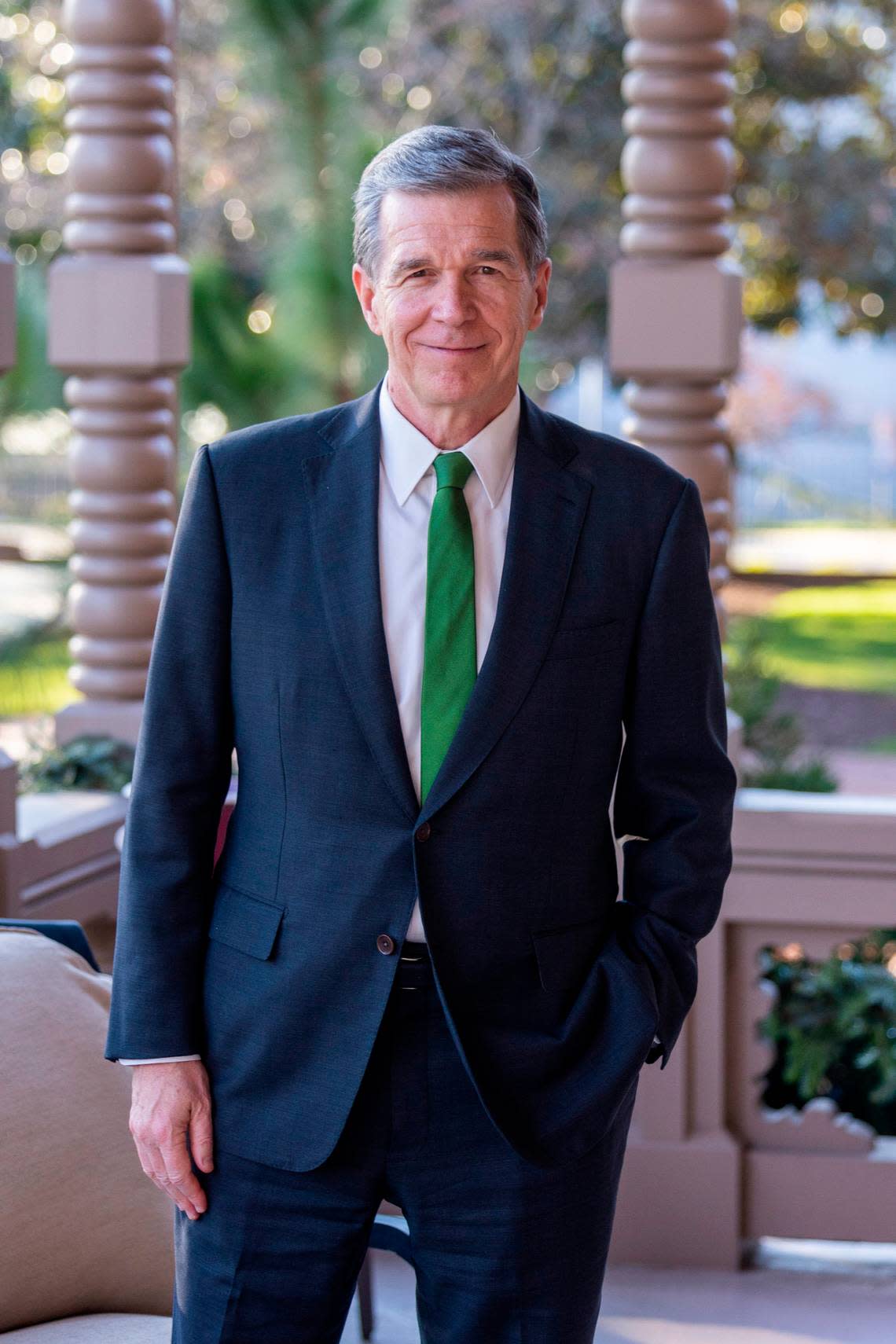What NC Gov. Roy Cooper says about upcoming legislative fights and what he wants to do next
In a year-end interview with The News & Observer, North Carolina Gov. Roy Cooper said he’ll fight against “business-killing culture war” and abortion bills in the upcoming legislative session that has swung back to a Republican supermajority in one chamber.
With two years left in his term and coming off a year at the helm of the Democratic Governors Association, Cooper also talked about his future in the party and wanting to stay in “public service.”
The N&O talked with Cooper in a brief interview days before Christmas, held at the Executive Mansion in downtown Raleigh, which was decorated for the holidays with multiple Christmas trees, garland and other seasonal decor. Preparations were underway for a holiday gathering that evening, with glasses and a punch bowl featuring the state seal of North Carolina set up on a table.

Democrats’ election
The N&O asked Cooper about Democrats doing well in the 2022 election nationwide, but not in North Carolina. The state Supreme Court flipped from a Democratic majority to a Republican majority. Republicans gained a supermajority in the Senate and are a single vote away from one in the House. Democratic U.S. Senate candidate Cheri Beasley lost the race to Republican Ted Budd.
Cooper questioned the assessment, suggesting a Republican gerrymander misrepresented voters.
“That’s debatable,” he said. “...And I’ll tell you why that’s debatable. You look at out of the three maps, the one map where we had fair districts ended up with seven Democrats, seven Republicans in Congress.”
He blamed other “unfair maps” for helping state Republicans secure “a supermajority by one vote.”
“Even though we lost this U.S Senate race and judges races, I still think this is a 50-50 state,” Cooper said. “When you look at people voting, the president’s party doesn’t do well, historically, in the first midterm.”
He added: “2024 — I think it’s gonna be different.”
In 2024, Cooper’s second term as governor will be up, and North Carolina limits governors to two consecutive terms.
So what’s next for Cooper?
Cooper’s future
For the past year or longer, Cooper has demurred when asked about his plans after leaving the Executive Mansion. As a Democratic governor in the South who has never lost an election — who previously served in the state’s General Assembly and as its attorney general — Cooper’s name occasionally appears as a possible contender for federal government roles.
When The N&O inquired again about his future, this time asking if he would rather have a Cabinet position or an elected office, Cooper offered an inkling of his plans.
“I do not know what is in store for me more than two years from now. I really don’t,” he said. “I’m gonna do the best job that I can as governor. I’ll see what doors open. I do like public service. But I’m gonna enjoy these next two years and be as productive as I can.”
Two more years as governor
Cooper said he has already handed over the gavel of chair of the Democratic Governors Association to his successor, but said there’s more work for governors to do together.
“Working with other governors has been one of the most enjoyable things I’ve ever done,” he said. “There’s been more of a focus on governors than ever before. And I think that really started happening during the pandemic, with the attack on the (U.S.) Capitol on Jan. 6, and the attempt to use state legislatures to change presidential electors, and protecting voting rights.”
The repeal of some federal protections have also amplified the importance of state governments and governors, Cooper added.
“Then you’ve got the U.S. Supreme Court with its ruling, taking away women’s rights that they’ve had in place for five decades, now throwing it as a political issue in the states,” he said. “So who’s governor matters a lot.”
Working with Republicans
Cooper said he wants to work with Republican leadership whenever he can, and noted how they’ve worked together in the past, especially on economic development, clean energy and job growth in the state.
“So I want to work with them whenever I can,” Cooper said. “I hope that there’s going to be a lot of negotiation and compromise regardless of the numbers. But you will still see me and I think you’ll see both House and Senate Democrats fighting for voting rights, fighting for women’s rights, fighting to stop business-killing culture war legislation. I still think you will see that dynamic.”
In 2016, HB 2, known as the “bathroom bill,” became law to prevent transgender people from using bathrooms in government buildings corresponding to the gender with which they identify. The resulting impact cost North Carolina’s economy millions of dollars when the NCAA men’s basketball tournament and other high profile events pulled out of the state. The law, which passed under previous Republican Gov. Pat McCrory, was later mostly repealed and Cooper defeated McCrory in the gubernatorial race.
In 2021, the Republican-majority legislature passed a similarly controversial bill that Democrats argued would again threaten the state’s economy. It regulated public education teaching about race and was described as anti-Critical Race Theory.
Cooper vetoed it.
“I hope that the Republican leadership understands that the reason we are the number one state in the country for business is because of our balance, and the fact that we do have a good business regulatory environment,” Cooper said. “We do invest in education. And we stop the culture war bills that have hurt a lot of states across the country, and which hurt North Carolina badly, a number of years ago.”

Supermajority votes
House Speaker Tim Moore, a Cleveland County Republican, has said that some House Democrats will vote with the Republican majority in the 2023 session, essentially giving them the same supermajority as the Senate.
Moore told reporters last week that he is “going to do all I can to get enough votes in (the House) that, should we run into a veto, that we’re able to override it.”
Cooper doesn’t think so.
“You know, they’ve been saying that for four years,” he said. “And yes, the numbers are closer, for sure. But also, these issues are important to the people of our state.”
The General Assembly has not successfully overturned one of Cooper’s vetoes since Republicans last held a supermajority in both chambers. But they might test his veto power in the coming session with new legislation on hot-button issues like abortion and voter ID.
North Carolina’s current law bans abortion after 20 weeks. Republicans have not yet said what an abortion bill might include.
“I think we should leave it alone,” Cooper said. “And I hope that enough people in the legislature will agree with that. I think there’s a lot of disagreement within the Republican Party on what would be done there.”
On voter ID, Moore has already said he plans to push for new legislation, along with other election-related bills.
“Voting rights is another issue that that would want to hold strong and not do any more,” Cooper said. “I think we’ve had some of the best-run elections in the country in our state with our election system the way it is. We really don’t need to mess it up.”
Employees and taxes
The state budget written by the General Assembly and sent to Cooper’s desk in 2023 is a two-year spending plan. Education spending is always top of mind, and top of spending debates, between Republicans and Democrats.
“We need to invest more in education, we need to invest more in our teachers. The pipeline is shrinking up,” Cooper said.
State agencies in North Carolina have seen 20% and higher vacancy rates this year.
“State government is competing for workers with the private sector, and we need to invest more in our state employees, and particularly for those hard to fill positions,” Cooper said. “So I know that we’ll be having discussion of whether we’re going to invest there, or whether we’re going to do more tax cuts for the wealthiest among us, like the General Assembly wants to do every year.”
Past budgets have included reductions in both the individual income tax rate and corporate income tax rate. Republicans are considering more tax cuts in the upcoming budget cycle. Senate leader Phil Berger, an Eden Republican, told reporters last week that he would “like to see us move forward with further reduction in personal income taxes” in the 2023 session.
Cooper said he wants tax cuts “for the middle class.”
“Let’s do them for the people who really need it,” he said.
On state employees and teacher pay, Berger cited the legislature’s increasing pay on a “regular basis.”
“So the question ultimately becomes how much a lot of that depends on, you know, what the revenue picture looks like, what our resources are, what other demands are are on all those state dollars,” he said. “So that will be part of the budgeting process.”
Berger added he doesn’t see his relationship with Cooper changing “that much” with the Republicans gaining a supermajority in the Senate.
“There are some things that we’re going to agree on,” he said. “There are some things that we’re not going to agree on. And the only thing that’s changed is whether or not we have the ability on those things that we disagree on to move forward what we would like to see happen.”
Infrastructure
Cooper said that in his final two years as governor he wants to stay involved with other governors of both parties “because of how our states can be the laboratories of democracy.”
“But also just protecting rights and freedoms and implementing transformational federal funds that we have coming to the states to connect everybody to high speed water and wastewater for transportation and for clean energy,” he said. “It’s truly generational what’s going to be happening in the next couple of years.”
On Wednesday, Cooper was in Yadkin County touting the federal investments in infrastructure. He said his administration will make sure the state invests federal money — about $2.3 billion in available funds for water and wastewater — “efficiently and effectively.”
“So we’re going to spend a lot of time making sure we get that money invested in people in the ground where it needs to be,” Cooper said. “That’s going to take a lot of time in my administration.”
Moore County
A different kind of infrastructure made headlines recently in North Carolina after two electrical substations in Moore County were taken out with gunfire, resulting in thousands of people and businesses being without power for days.
Both Cooper and Republican leaders have said they want to harden infrastructure to prevent future incidents like the electrical substations attack in Moore County.
Cooper said he’s not getting specific updates from the FBI or State Bureau of Investigation, but that he knows they “are chasing down leads, they are working hard to find out who did this.”
The state, Moore County and Duke Energy are offering rewards of up to $75,000 for tips that lead to arrest and convictions of those responsible for the attacks.
“But we’re also talking with utilities and Homeland Security and others about how we partner and how we protect it more,” Cooper said. “Because clearly, it’s unacceptable to have 40,000 people lose power immediately like that.”
Cooper, Berger and Moore have all said it’s too soon to say what, if any, legislation might be needed, but they want to find out more through the investigation. Cooper said the issue is complicated and that smart investments in grid protections are needed so it doesn’t “end up coming back to the consumer.”
The General Assembly returns on Jan. 11, when new lawmakers will be sworn in. Then, after about a two-week break, the legislature will begin the work of the long session.

